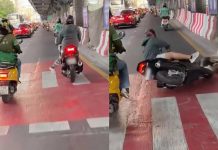BANGKOK, 9 April 2015 – The Pollution Control Department (PCD) has named 11 rivers which are unfit for the water-splashing activities for Songkran revelers due to their high concentrations of Coliform bacteria.
The 11 rivers reportedly contain an excess of 4,000 units of fecal coliform, which is an indicator of water quality from natural sources. Fecal coliform bacteria are the most common microbiological contaminants of natural waters. They in the digestive tracks of warm-blooded animals, including humans, and are excreted in the feces. Some of these bacteria can cause illnesses such as ear infections, typhoid, hepatitis A, and cholera.
The rivers with alarming levels of Coliform bacteria include the Yom River in Muang district of Sukhothai province, Kwan Phayao in Muang district of Phayao province, the Chao Phraya River in Muang District of Nakhon Sawan province, the Loei River in Muang district of Loei province, Lampao River in Muang and Kamalasai districts of Kalasin province, and the Chumphon River in Muang district of Chumphon province
The water in the city moat in Chiang Mai meanwhile is of moderate quality. Experts said that the water was usable for the water-splashing activities but suggested revelers avoid its direct contact with skin wounds. Merrymakers who use water from natural sources are advised to test the water quality by observing its color and smell and their skin’s reaction to it.
Experts also suggested that revelers wash their bodies immediately after finishing the Songkran water-splashing activity.




